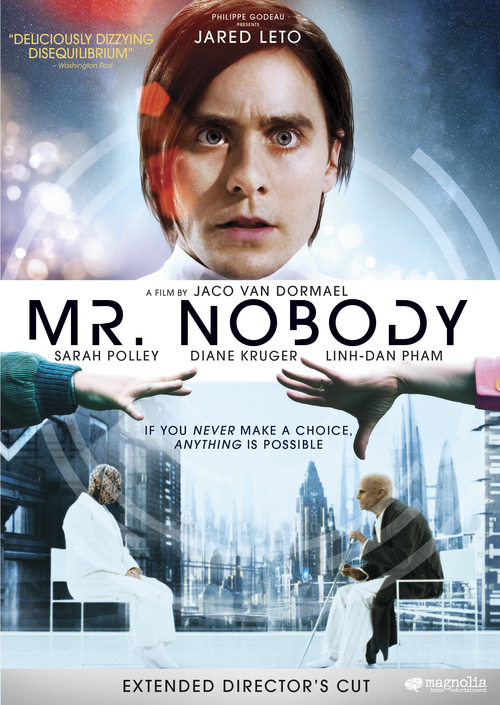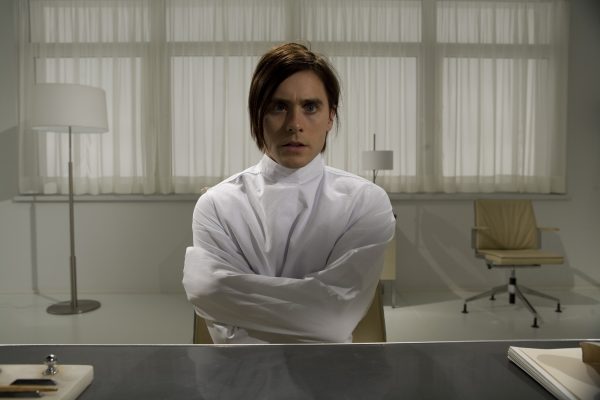“Mr. Nobody” (2009 production, 2013 release). Cast: Jared Leto, Sarah Polley, Diane Kruger, Linh-Dan Pham, Rhys Ifan, Juno Temple, Natasha Little, Toby Regbo, Clare Stone, Audrey Giacomini, Thomas Byrne, Laura Brumagne, Léa Thonus, Anaïs Van Belle, Allan Corduner, Daniel Mays, Harold Manning, Noa De Costanzo, Michael Riley, Benjamin Mansfield, Chiara Caselli. Director: Jaco Van Dormael. Screenplay: Jaco Van Dormael. Web site. Trailer.
Is the life we lead the one (and only one) we’re meant to live? Or are there other possible paths that we could choose, alternatives that are different but potentially just as viable, even though not actively pursued? However, if those alternate existences do indeed exist, how would we know about them? Could we, in fact, grasp anything about them if they remain off our radar, “dormant” in an unmanifested state? But suppose we were to possess the ability to peer into those other realities to see what they’re like. That could be quite intriguing and revealing. Yet wouldn’t that become confusing, conflicting with what we think we know about the nature of existence? What would our “real” reality be then? Those are among the many questions raised in the sci-fi/fantasy cult classic, “Mr. Nobody.”

Nemo (Jared Leto) has lived a long and interesting life. In the year 2092, at age 118, he is the last mortal human left alive on earth. Thanks to advances in telomere research and life prolongation, humanity has attained a de facto form of immortality, making someone like Nemo quite the scientific and cultural curiosity. But now, with his health failing and death looming, the public has become fascinated with him, wanting to know how someone could let his condition slide to such a depleted state. What’s more, everyone is consumed with learning about life before the onset of technologically induced immortality, especially since the last witness to it is now on his death bed. After all, when he goes, so does knowledge of that time in humanity’s existence, never to be retrieved again (or so it’s believed).
So what do humans of the future want to know about their species’ disappearing and increasingly mysterious past? Well, for example, now that humanity has attained virtual immortality, there’s no real need any more for procreation, which means there’s also no longer any real need for sex. Consequently, those future descendants of ours are innately curious about such practices now that they’ve fallen out of everyday life. They want to learn as much as they can before the knowledge disappears forever.
Because of this, there’s a big push to learn as much as possible while Nemo is still alive, especially now that his own recollections are beginning to fade. For starters, he’s questioned about his memories through a series of hypnosis sessions with a psychiatrist, Dr. Feldheim (Allan Corduner). Then he becomes the reluctant subject of a pop culture TV show emceed by a wide-eyed manic host (Harold Manning), a program where viewers have an opportunity to “vote” on Nemo’s fate. But the person who develops the most intimate, most intense, most meaningful bond with the unwitting geriatric celebrity is a young journalist (Daniel Mays) who sneaks into Nemo’s hospital room and conducts a lengthy impromptu interview with his subject.
Nemo initially wonders why anyone would want to know so much in-depth information about his life. But, the more Nemo talks, the more details he reveals. And, as the discussion progresses, he ends up telling a captivating tale, one that engages, fascinates and confounds all at the same time, leaving his interviewer’s head spinning with each passing revelation.
As Nemo tells it, he underwent an unusual experience during the time before he began his current incarnation. According to Nemo, all children remember their future at the time of their conception until angels come along and erase their memory before birth. In Nemo’s case, however, the angels missed him, and he was born with this knowledge intact, an awareness that would come to be both a blessing and a curse.
When Nemo makes his terrestrial arrival in England, he becomes the son of a mother (Natasha Little) and father (Rhys Ifan) who appear to be blissfully happy. But, by the time he becomes a youngster of five (Noa De Costanzo), he witnesses something that shatters that myth: He sees his mother kissing another man, Harry (Michael Riley). He keeps mum about the incident at the time, but, four years later, a nine-year-old Nemo (Thomas Byrne) finds himself on a train platform with his parents politely but insistently pressuring him into making an impossible decision: leaving with his mother, who is resettling in Montreal with Harry, or staying in England with his father.

The choice is overwhelming. It becomes the first of three key decision points he’ll face in his life, the next one coming as a 15-year-old adolescent (Toby Regbo) and the third arriving as a 34-year-old adult. The basic decisions he’s faced with having to make at each of those times are far from easy, and they then become further complicated by the many subsequent decisions he’ll have to make in the wake of those initial choices. And that’s because he, like all of us, is presented with an infinite range of possibilities that arise during each of those succeeding moments in time, new choice points that each have the power to take us in myriad directions depending on which option we choose.
What’s perhaps most interesting about all this is that Nemo “remembers” all of the different permutations he chose in his “life,” relating each of them to an increasingly perplexed questioner anxious to find out which of those various pasts is the “right” one. Nemo confuses his interrogator even further with the answer he gives to that question, one that would likely stretch credibility for virtually anyone lacking Nemo’s ability (even though it's a capacity that's perfectly reasonable and “normal” to him).
The first big decision Nemo must make sets him off in two vastly different directions. In the reality where he chooses to go with his mother, he finds himself becoming bitter and resentful, even though there are compensating factors that help to make up for much of his displeasure. By contrast, in his existence with his father, he experiences a generally contented home life, though various disappointments and setbacks intrude upon that happiness. These diverse outcomes reveal just how difficult making that initial decision really was.
Many of the choices that Nemo makes in conjunction with the next two big decisions carry wide-ranging implications for the unfolding of his life, particularly in matters of romance. In each of those scenarios, Nemo is faced with having to make decisions about his love life involving three women, Anna (Laura Brumagne), Elise (Léa Thonus) and Jean (Anaïs Van Belle), all of whom he meets in childhood. As a teen, he experiences his first meaningful romantic encounters with each of them. In Canada, while living with his mom, he reunites and embarks on a torrid romance with Anna (Juno Temple), who, ironically, turns out to be Harry’s daughter. It’s a relationship doomed to fail, however, when his mother and her beau split up, with Harry and Anna relocating to New York. Meanwhile, back in England with dad, Nemo develops a steamy but volatile infatuation with Elise (Clare Stone), who callously breaks his heart and sends him rebounding into the arms of Jean (Audrey Giacomini), an adoring young woman he doesn’t really love despite her undying heartfelt devotion for him.

Years later, Nemo finds himself still involved with all three women to one degree or another. Despite many years of separation, a seemingly chance encounter reunites the now-adult Nemo and Anna (Diane Kruger) a second time for another passion-filled romance that, despite the best of intentions, is again doomed when fate intercedes. But this isn’t Nemo’s only heartache-filled romance. In another line of existence, he finds himself married to Elise (Sarah Polley), a relationship he strives desperately to salvage but that is fraught with frustration brought on by his wife’s numerous insecurities and bouts of deep depression. And, in yet another reality, Nemo, an eminently successful businessman who lives on a palatial estate, is married to Jean (Linh-Dan Pham), who adores him despite his silent and growing indifference toward her.
The unfolding of these various lines of existence is told through a series of intercut segments. In addition to Nemo’s romantic experiences, the film explores other aspects of his “life,” including his careers as a swimming pool maintenance worker, a science fiction writer, a narrator of scientific and metaphysical television shows, and a wealthy businessman, as well as how he arrived at the decisions to pursue these endeavors, the synchronicities and foreknowledge that drew him to make these choices, and the mitigating factors that contributed to their materialization. The combination makes for a kaleidoscopic view of “a life” in all its various iterations.
Upon relating these experiences, Nemo’s interrogator is left more bewildered than ever. How could someone have possibly experienced all these different events, especially given their apparent simultaneous nature? Is Nemo senile or insane? Or is something even more astounding taking place here? That’s what the intrepid journalist and viewers are about to find out. The answer may indeed seem improbable, but, if true, it could prove to be more revelatory and wondrous than any of us ever could have imagined. It might even win over a few skeptics in the process. And wouldn’t that be something?
For many of us, the ability to live overlapping existences seems wholly implausible. How can someone experience multiple life paths simultaneously? Doesn’t that suggest a certain inherent incongruity that’s impossible to resolve? But, upon further consideration, couldn’t the same argument be made about someone who concurrently possesses seemingly contradictory attributes or abilities? How do we account for those situations?

As those versed in quantum physics and various metaphysical doctrines are well aware, at any given moment, we have an ability to experience an infinite range of outcomes, depending on what we choose and where we focus our attention. Each individual moment is a choice point, and the decision we make will dictate how events unfold. Because of how our consciousness is wired, we typically make one choice in each of those moments, which accounts for why our lives play out in what appear to be singular lines of probability. That’s what makes reality seem like it’s unfolding in a purely linear fashion.
But what if we possessed the ability, as Nemo apparently does, to experience more than one line of existence simultaneously? Many of us might find the prospect confusing, which is why we generally choose to experience lines of probability one at a time. However, if such a multidimensional option is available to us, isn’t it possible that some of us may be able to experience it, to see what it’s like to explore and discover the intricacies of our multidimensional selves? If so, though, how could that occur?
Realizing such a manifestation is indeed possible if we allow it, and that’s where the power of our thoughts, beliefs and intents comes into play. By drawing upon them through the conscious creation process, the philosophy that maintains we tap into these resources in materializing the reality we experience, we have an opportunity to immerse ourselves in the existence of our choosing – even one of a multidimensional nature. And that is what Nemo does, even if he’s not consciously aware of how or why he does so and the specific beliefs that make such an outcome possible.
Because all probabilities are possible, there’s an inherent validity in each of them. Whether they’re single lines of existence or multidimensional in nature, they each have an intrinsic legitimacy, for better or worse. And the thoughts, beliefs and intents we choose to embrace make their manifestation happen, aided by various belief-inspired tools that help to facilitate the process, as Nemo comes to discover for himself. For example, Nemo draws upon the innate foreknowledge that the angels failed to deprive him of. Then there are the numerous synchronicities he experiences, “coincidental” clues that help to point him in the direction of his goals. He’s even impacted by the phenomenon commonly known as “the Butterfly Effect” in which widely removed, seemingly unrelated events play a role in the ultimate unfolding of what are generally considered to be wholly disparate occurrences. Who would think, for example, that the act of a man boiling an egg in Brazil would eventually have an effect on the outcome of Nemo’s relationship with Anna in adulthood?
These influences lead to how Nemo’s existence plays out, because his beliefs in them (even if subconscious in nature) enable their manifestation and the subsequent roles they fulfill in shaping the tangible character of his everyday reality. And, because he experiences existence from a multidimensional perspective, there are specialized influences that are part and parcel in its particular unfolding. For instance, because he experiences overlapping lines of probability concurrently, he needs to create conditions that make such an outcome possible, namely, the existence of simultaneous time. Such a concept may seem foreign, if not wholly impossible, to those of us who are bought into the notion of reality unfolding exclusively in singular fashion. But, for someone like Nemo, who takes a multidimensional approach, his created existence wouldn’t be feasible were it not for simultaneous time to enable the parallel life paths to manifest concurrently. Suddenly, what seems to be a paradoxical notion to most of us doesn’t appear to be quite so far-fetched, provided we allow ourselves to believe in the manifestation of such an unconventional possibility.

The bottom line in all this for Nemo (and the rest of us for that matter) is that we can live lives full of richly rewarding experiences, including some that would even seem to defy what we think of as the unbending laws of probability. That’s possible thanks to the ability to use our beliefs to surpass limitations. Of course, in order for that to happen, we must believe that the limitations can be surpassed in the first place, a possibility that’s also entirely possible, again as long as we allow ourselves to believe in it. That might appear difficult at first glance, but, when we consider what such a choice could yield, we might well reconsider our decision. When we see what it can do for someone like Nemo, whose life is characterized by a panoramic range of life’s experiences, we may want the same for ourselves – and seek the means to make it happen.
I have to wonder how this superb 2013 release slipped under my radar, but I’m certainly glad I found it. This ambitious attempt at answering many of the big questions about the meaning of life, love and what matters does a tremendous job of exploring these topics and in a way that’s entertaining, enlightening and informative. Fans of the metaphysical, like yours truly, are sure to feel sufficiently nourished after watching this one, as it provides a cogent, accessible treatise on these subjects, effectively incorporating them into a thoroughly captivating narrative. Admittedly there are a few stretches in the middle where the pacing lags a bit, but that’s more than compensated for by the film’s inventive visuals, brilliant production design, excellent soundtrack, clever editing, and fine performances by Leto, Kruger, Polley and Byrne. Think of this offering as a fusion of “What the Bleep Do We Know” (2004), “Cloud Atlas” (2012), “What Dreams May Come” (1998), “The World According to Garp” (1982) and additional offerings, and you’ve got an idea what this one is like. However, if you’re unwilling to open your mind to some of the cutting-edge thinking presented here, then skip this one, as it probably won’t be to your liking. But, if you enjoy the unconventional and thought-provoking, this one will be right up your alley. If nothing else, this cult classic is definitely a refreshing change from all of this year’s mediocre and tedious awards season offerings that are undeservingly being passed off as “masterpieces.” The film is available for online streaming, as well as on DVD and Blu-ray Disc.
Deciphering the mystery of life is an endeavor to which many of us devote our entire earthly stays, often arriving at incomplete, unsatisfying or muddled answers, if any at all. We keep searching for definitive explanations that will sum it all up for us in neat, tidy little packages, assuming, of course, that some kind of one-size-fits-all solution is indeed available and universally acceptable. But, unless someone out there is harboring a very well-kept secret, such an animal simply doesn’t exist. In fact, as Nemo’s experience shows, the answers are likely even more elusive than we realize. So, given the absence of an airtight, all-encompassing explanation, perhaps the most viable answer we can come up with is to simply accept that “Life is its own answer.” To some, that may seem like a glib cop-out. But, in the end, in light of our current understanding of the nature of existence, this may be our best option. Sitting back and enjoying the ride, making tweaks where we’re able to, may ultimately prove more fulfilling than any futile attempt at dissecting the nature of our being only to arrive at an explanation that’s innately unfinished, inadequate and imperfect. We would miss out on so much by staying such a wayward course. And, as Nemo’s example illustrates, there’s so much to be experienced and enjoyed that we have never envisioned and that we’re just now beginning to discover. It would be a shame to pass that up in favor of chasing illusory phantoms that can’t possibly deliver to us what only life itself in all its mysterious glory can.
Copyright © 2021, by Brent Marchant. All rights reserved.

No comments:
Post a Comment